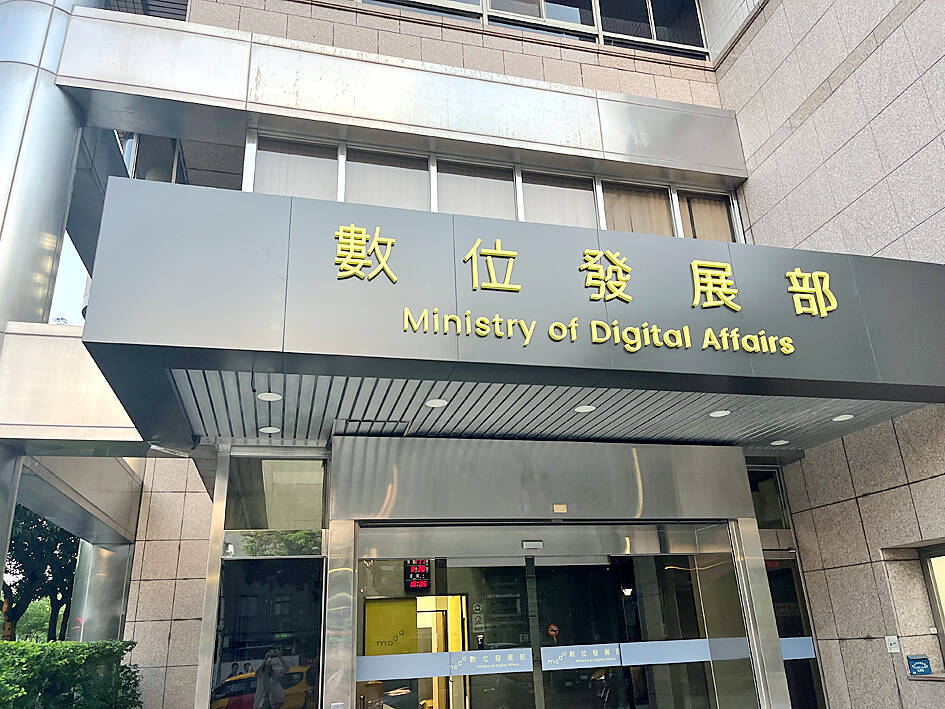Following a surge in phishing scams, the Ministry of Digital Affairs on Tuesday fined online marketplace Shopee and local bookstore Eslite for failing to protect customer data.
Singapore-based Shopee and Eslite Spectrum Co were fined NT$200,000 and NT$100,000 respectively for contravening the Personal Data Protection Act (個人資料保護法), the ministry said in a statement.
Shopee, which the Criminal Investigation Bureau in March said was the consumer-to-consumer (C2C) platform on which people were most likely to be exposed to phishing scams, failed to take concrete action to address the threats it faced, the ministry said.

Photo: Hsu Tzu-ling, Taipei Times
When Shopee was asked for information, it only provided a limited amount of data about customer safety, the ministry said, adding that it failed to prove it had taken the necessary measures to protect customer data.
Shopee also failed to effectively supervise partners it outsources to, which contributed to the leak, the ministry said.
Reports to the 165 anti-fraud hotline led to the discovery of the phishing attacks on C2C platforms, it said.
The hackers’ goal is to steal personal or business information used by customers to carry out online transactions and use it to scam people, it said.
Eslite was found to have poor account management during an on-site inspection, the ministry said.
The bookstore came under fire last month after a customer’s private data were allegedly leaked to a supposed Chinese agent.
NGO worker Cynthia Yang (楊欣慈) received a telephone call in February from someone claiming to be a Taiwanese pollster who asked questions about a book titled If China Attacks (阿共打來怎麼辦), which Yang had purchased from Eslite’s online bookstore.
However, the caller’s accent and terminology suggested they were not Taiwanese, said Yang, who is deputy executive secretary of the Here I Stand Project, a Taiwanese non-profit organization that seeks to promote the nation’s youth internationally.
The caller also kept emphasizing how “sensitive” the book’s contents were and insisted that “a military unification [of Taiwan and China] was inevitable,” Yang told a news conference held by her organization and the Taiwan Statebuilding Party on May 14.
The ministry said that it would continue to monitor the companies and other e-commerce firms.
Shopee and Eslite need to make improvements soon to avoid more fines, it added.

POSITIVE DEVELOPMENT: Japan and the US are expected to hold in-depth discussions on Taiwan-related issues during the meeting next month, Japanese sources said The holding of a Japan-US leaders’ meeting ahead of US President Donald Trump’s visit to China is positive news for Taiwan, former Japan-Taiwan Exchange Association representative Hiroyasu Izumi said yesterday. After the Liberal Democratic Party’s landslide victory in Japan’s House of Representatives election, Japanese Prime Minister Sanae Takaichi is scheduled to visit the US next month, where she is to meet with Trump ahead of the US president’s planned visit to China from March 31 to April 2 for a meeting with Chinese President Xi Jinping (習近平). Japan and the US are expected to hold in-depth discussions on Taiwan-related issues during the

‘LIKE-MINDED PARTNER’: Tako van Popta said it would be inappropriate to delay signing the deal with Taiwan because of China, adding he would promote the issue Canadian senators have stressed Taiwan’s importance for international trade and expressed enthusiasm for ensuring the Taiwan-Canada trade cooperation framework agreement is implemented this year. Representative to Canada Harry Tseng (曾厚仁) in an interview with the Central News Agency (CNA) said he was increasingly uneasy about Ottawa’s delays in signing the agreement, especially as Ottawa has warmed toward Beijing. There are “no negotiations left. Not only [is it] initialed, we have three versions of the text ready: English, French and Mandarin,” Tseng said. “That tells you how close we are to the final signature.” Tseng said that he hoped Canadian Prime Minister Mark Carney

President William Lai (賴清德) yesterday bestowed one of Taiwan’s highest honors on Saint Vincent and the Grenadines (SVG) Ambassador Andrea Clare Bowman in recognition of her contributions to bilateral ties. “By conferring the Order of Brilliant Star with Grand Cordon on Ambassador Bowman today, I want to sincerely thank her, on behalf of the Taiwanese people, for her outstanding contribution to deepening diplomatic ties between Taiwan and SVG,” Lai said at a ceremony held at the Presidential Office in Taipei. He noted that Bowman became SVG’s first ambassador to Taiwan in 2019 and

A man walks past elementary school artworks at the Taipei Lantern Festival in Ximen District yesterday, the first day of the event. The festival is to run from 5pm to 10pm through March 15.